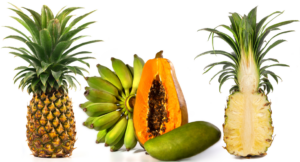
Sarah Britton


In the fast-paced and demanding world we live in, finding moments of stillness and calm can be challenging. In an attempt to find a little peace...
If you want to get your gut in order, Dr Will Bulsiewicz is the expert to help you sort out fact from fiction. This is the gut-health cheat sheet...
Simple homemade wholemeal pastry encases the delicious savoury filling in these comforting, nourishing vegan pies. If you're yet to experiment...
A baked fruit crumble with crunchy granola topping and warm custard – this wholefood, plant-based creation is the ultimate guilt-free...
The tahini, almond butter and silken tofu in this Middle Eastern-inspired recipe create a super creamy mousse, which pairs beautifully with the...
This crowd-pleasing dish is easier than you might think and features flaky pastry, zesty capers, and the star of the show, whipped plant-based...
Simple but delicious, this quinoa Buddha bowl with lemon and tahini dressing is packed full of vibrant and nutritious ingredients.
Delicious, nourishing and great for gut health, embrace coconut this summer, starting with this refreshing breakfast popsicle recipe by...
Spraying sheets and pillows with calming scents can be a wonderful aid to slumber
The next time you go for a walk, discover the wonder of the everyday world around you
A skincare routine can be a way to nourish yourself inside and out
When the clouds converge, practise gratitude for the smallest of glimmers, and learn to dance in the rain.
It’s not just what you eat, but how you absorb it that matters. Optimising your digestion is the secret ingredient of becoming your healthiest self, without the gimmicks. Here’s how.
It’s almost impossible to keep track of all the health advice out there promising more energy, vitality, super-human performance, vibrant skin, luscious locks – you name it, it exists! However, it’s our gastrointestinal functioning (our gut health) and its ecology (our biome) that are at the very core of our health. How well we are able to digest and absorb our food greatly influences our wellbeing. Remember, we’re not just what we eat, but how we absorb it! More than half of human disease is related to poor digestion, and there’s plenty you can do to support your body naturally that doesn’t involve gimmicks, products, diets, or cleanses. Simply put, our bodies are designed to ingest, digest, assimilate, utilise, optimise, and cleanse. And there are so many things within our control that can either support or hinder our body from doing what it’s meant to do.
Digestion starts in the mouth when our teeth mechanically break down the food we eat. Our enzyme-rich saliva kicks in shortly after to begin the chemical digestion of our food. It is essential that we chew properly, since at no other point in the digestive process do we have the chance to increase the surface area of what we’ve eaten (and more surface area means more available nutrients). Saliva is also key, so remember to chew even things like smoothies to signal nourishment is on the way to the rest of your body.
Food (well chewed hopefully!) travels down into our stomach where it is exposed to our powerful digestive juices. Food is churned and mixed before entering the small intestine, where most digestion and absorption takes place. The small intestine has specialised villi and microvilli (tiny hair-like projections that protrude from the walls of the small intestine). These increase surface area so that more nutrients can be absorbed. Next comes bile made by the liver and enzymes from the pancreas, both of which aid in the chemical breakdown of our food, extracting usable nutrition from the food we eat.
From here, food moves into our large intestine, where 100 trillion bacteria work to break down fibre for our body’s energy production and also to synthesise vitamins. The large intestine squeezes in a wave-like motion called peristalsis, which moves the remaining solids through the ascending, transverse, then descending colon, where any remaining water is removed before what is left exits our body as waste (or, in other words, poop). Ideally, we would all be having one to three bowel movements daily, passing them easily. They would be a medium-brown colour, the consistency of banana, and have no recognisable food particles. If this doesn’t sound like you, don’t worry, there are many ways to improve your digestion – keep reading!
When our digestion isn’t functioning optimally, this commonly shows up as gas, bloating, acid reflux, too-loose or too-firm bowel movements, constipation, or diarrhoea. We’ve all experienced these at times, often depending on what we eat, our hormonal cycle, the time of year, or our stress levels. Our digestion is supremely sensitive to external influences and changes in our lives. Things that influence our digestion can be broken down into three main categories: actions, environment, and mood. Watch your digestion improve when you apply the following tips before enjoying each meal or snack!
The best way to optimise your digestion is to increase the sources of fibre in your diet! Fibre helps bowel movements, balances cholesterol, regulates blood sugar, gives a feeling of fullness, reduces risk of diabetes and cancer, and provides prebiotics for our body. Fibre is found in all fruits, vegetables, beans, legumes, nuts, seeds, and whole grains.
Remember, water is essential in so many ways, especially with a high-fibre diet. It is the foundational component of digestive secretions, it allows food to pass smoothly throughout the digestive tract, and it keeps poop soft for an easier transit through our system. Aim to drink two litres of water daily (not during mealtimes) and eat plenty of high-water content fruits and vegetables.
Magnesium naturally relaxes muscles in your body, including those of the gastrointestinal tract, which allows for smoother functioning. Taking magnesium can offer relief from abdominal cramping, gas, and constipation for some people (be sure to take the citrate form if looking to help with constipation). Magnesium-rich foods include cacao, pumpkin seeds, almonds, spinach, cashews , quinoa, and avocado.
Incorporating digestive enzymes in your diet can support the breakdown and absorption of food, such as papain found in papaya or bromelain found in pineapple. Supplement forms are also available, but some contain animal products, so look out for vegan-friendly brands.

Probiotics are friendly bacteria that live inside our guts. Collectively they improve digestion of proteins, carbohydrates and fats, and contribute to the absorption of minerals. They enhance immune function, help manage blood sugar levels, combat fungal and yeast infections, and limit the action of disease-causing bacteria. Foods rich in probiotics include all naturally-fermented foods like sauerkraut, kimchi, miso, tempeh, and beverages like kombucha and kefir. These are all powerful foods, so indulge accordingly – too much is too much! Probiotic supplements can be taken therapeutically after a round of antibiotics to recolonise the gut.
Prebiotics are the food the bacteria outlined above live on. Each dietary choice we make empowers a different set of these microbes, which is why eating a wide variety of foods is so important for gut health. Prebiotic foods include oats, peas, beans, apples, citrus, and barley, which contain soluble fibre. Then there’s oats (again), cooked and cooled white potatoes and rice, beans, lentils, and unripe bananas, which are valuable sources of resistant starch.
When you feed the good bacteria in your body with a diverse, plant-rich buffet, they reward you postbiotics, which are essentially the by-products of probiotics. You can’t consume postbiotics in either food or supplement form, and they are unique to you. They are created depending on what you (and therefore your gut bacteria) have been eating. Short-chain fatty acids, proteins, and metabolites are some of the postbiotics that can be created, and these compounds have various functions in the body, including supporting your immune system, preventing or treating diarrhoea, reducing the severity of allergies, and more. They may even help to boost mood and cognitive function!
Moving your body and getting adequate rest are also important for optimising your digestion. Regular physical activity increases blood circulation, improves the tone and strength of your gastrointestinal tract, and supports smooth elimination. Getting a good night’s sleep regulates hormones, cleans and prepares our gastrointestinal tract for the next day, and sets us up to make healthier choices throughout the day. Remember, we all experience distress at times in our lives, which can affect our digestion. Being kind, gentle, and supportive to our body is just as important as what we eat.
All this digestive work goes unseen to us, but has such a huge impact on our daily lives. Your body is truly amazing! Optimising digestion is possible for all of us. With these tips, you can help it do what it needs to do, comfortably!
If you want to get your gut in order, Dr Will Bulsiewicz is the expert to help you sort out fact from fiction. This is the gut-health cheat sheet...
In the fast-paced and demanding world we live in, finding moments of stillness and calm can be challenging. In an attempt to find a little peace...
Spraying sheets and pillows with calming scents can be a wonderful aid to slumber
The next time you go for a walk, discover the wonder of the everyday world around you
A skincare routine can be a way to nourish yourself inside and out
When the clouds converge, practise gratitude for the smallest of glimmers, and learn to dance in the rain.